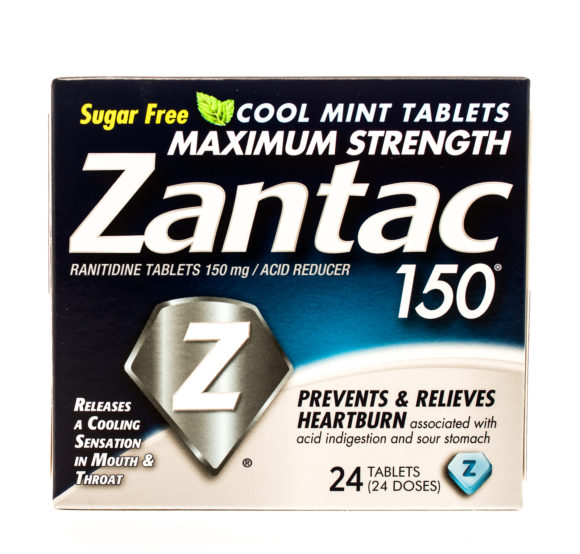Global health regulators sounded a coordinated alarm about the possibility that a stomach drug taken by millions of people could be tainted with the same cancer-causing agent that has sparked a worldwide recall of blood-pressure pills.
Drug-safety officials in the U.S. and Europe said Friday that they were looking into whether Sanofi heartburn medication Zantac and generic versions made by numerous manufacturers contain levels of the probable carcinogen NDMA that could pose a danger to patients.
Ranitidine, as the drug is known in generic form, is an antacid and antihistamine used to treat and prevent a range of gastrointestinal disorders. The chemical NDMA, or N-Nitrosodimethylamine, is a likely human carcinogen found in cooked or cured meats such as bacon, and is a common industrial byproduct.
The discovery further underscores the challenge pharmaceutical-industry regulators face in overseeing a vast global supply chain of drugs, drug ingredients and factory processes. Dozens of versions of the hypertension treatment valsartan have been recalled since last year out of concern they could be contaminated with NDMA. Many of those drugs were made in China or India, raising questions about the quality of generic manufacturing in far-flung factories around the globe.
The review of ranitidine comes after Valisure, a New Haven, Connecticut-based online pharmacy that tests all the medications it dispenses, alerted the U.S. Food and Drug Administration that it had detected high levels of NDMA in both generic and brand versions of Zantac sold at major pharmacies run by companies including Walgreens Boots Alliance Inc., CVS Health Corp. and Walmart Inc.
The FDA said in a statement Friday it would review branded and generic versions of the medication. The European Medicines Agency said it “is evaluating the data to assess whether patients using ranitidine are at any risk from NDMA and will provide information about this as soon as it is available.”
Sanofi officials didn’t comment immediately when reached by phone.
Sanofi shares briefly declined but were higher in recent U.S trading, gaining 0.7% to $44.12 at 10:57 a.m. in New York.
The generic versions are made by multiple global manufacturers, including Teva Pharmaceutical Industries Ltd., whose shares fell as much as 3.4% in New York trading Friday. Mylan NV, which also makes a version of the drug, declined 0.5%.
Researchers at the Memorial Sloan Kettering Cancer Center are also looking into whether NDMA levels in generic and brand-name Zantac may be linked to an increased risk of cancer based on the findings shared by Valisure, said Lior Braunstein, an oncologist at Sloan Kettering who is co-leading the research on Zantac.
Zantac and its generics are sold with and without a prescription in different strengths. Almost 25 million prescriptions for the drugs were written in 2018, according to Bloomberg Industries data.
“There’s no acceptable cancer risk for a drug like this,” David Light, chief executive of Valisure, said.
Valisure filed a petition with the FDA on Friday asking the agency to recall Zantac and its generics that contain NDMA. The FDA said the NDMA levels in the drugs are low, while Valisure’s petition called them “excessive.”
“The FDA will take appropriate measures based on the results of the ongoing investigation,” Janet Woodcock, director of the FDA’s Center for Drug Evaluation and Research, said in the statement. “The agency will provide more information as it becomes available.”
Zantac isn’t just taken by adults. It is also given to infants suffering from reflux in a syrup form that requires a prescription.
The FDA found NDMA levels as high as 17 micrograms in blood-pressure pills recalled starting in July 2018. Valisure detected NDMA levels as high as 3,000 micrograms in Zantac pills and its generics. In the wake of recalls of blood-pressure drugs, the FDA set an NDMA limit of less than one microgram for the pills and required all companies that make the hypertension treatments to test for the contaminant.
Was this article valuable?
Here are more articles you may enjoy.


 Explosive Wildfires Surge Through Oklahoma Panhandle and Kansas
Explosive Wildfires Surge Through Oklahoma Panhandle and Kansas  NYC Travel Snarled by Snow as Central Park Gets 15 Inches
NYC Travel Snarled by Snow as Central Park Gets 15 Inches  When the Workplace Is Everywhere: The New Reality of Workers’ Comp Claims
When the Workplace Is Everywhere: The New Reality of Workers’ Comp Claims  ‘Structural Shift’ Occurring in California Surplus Lines
‘Structural Shift’ Occurring in California Surplus Lines 